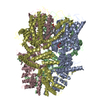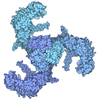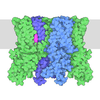+ Open data
Open data
- Basic information
Basic information
| Entry | Database: PDB / ID: 7b05 | ||||||
|---|---|---|---|---|---|---|---|
| Title | TRPC4 in complex with inhibitor GFB-8749 | ||||||
 Components Components | Transient receptor potential cation channel subfamily c member 4a | ||||||
 Keywords Keywords | TRANSPORT PROTEIN / ION CHANNEL / TRPC4 / INHIBITOR / COMPLEX / MEMBRANE PROTEIN | ||||||
| Function / homology |  Function and homology information Function and homology informationmonoatomic cation transport / monoatomic cation channel activity / calcium channel activity / plasma membrane Similarity search - Function | ||||||
| Biological species |  | ||||||
| Method | ELECTRON MICROSCOPY / single particle reconstruction / cryo EM / Resolution: 3.8 Å | ||||||
 Authors Authors | Vinayagam, D. / Quentin, D. / Sistel, O. / Merino, F. / Stabrin, M. / Hofnagel, O. / Ledeboer, M.W. / Malojcic, G. / Raunser, S. | ||||||
| Funding support |  Germany, 1items Germany, 1items
| ||||||
 Citation Citation |  Journal: Elife / Year: 2020 Journal: Elife / Year: 2020Title: Structural basis of TRPC4 regulation by calmodulin and pharmacological agents. Authors: Deivanayagabarathy Vinayagam / Dennis Quentin / Jing Yu-Strzelczyk / Oleg Sitsel / Felipe Merino / Markus Stabrin / Oliver Hofnagel / Maolin Yu / Mark W Ledeboer / Georg Nagel / Goran ...Authors: Deivanayagabarathy Vinayagam / Dennis Quentin / Jing Yu-Strzelczyk / Oleg Sitsel / Felipe Merino / Markus Stabrin / Oliver Hofnagel / Maolin Yu / Mark W Ledeboer / Georg Nagel / Goran Malojcic / Stefan Raunser /   Abstract: Canonical transient receptor potential channels (TRPC) are involved in receptor-operated and/or store-operated Ca signaling. Inhibition of TRPCs by small molecules was shown to be promising in ...Canonical transient receptor potential channels (TRPC) are involved in receptor-operated and/or store-operated Ca signaling. Inhibition of TRPCs by small molecules was shown to be promising in treating renal diseases. In cells, the channels are regulated by calmodulin (CaM). Molecular details of both CaM and drug binding have remained elusive so far. Here, we report structures of TRPC4 in complex with three pyridazinone-based inhibitors and CaM. The structures reveal that all the inhibitors bind to the same cavity of the voltage-sensing-like domain and allow us to describe how structural changes from the ligand-binding site can be transmitted to the central ion-conducting pore of TRPC4. CaM binds to the rib helix of TRPC4, which results in the ordering of a previously disordered region, fixing the channel in its closed conformation. This represents a novel CaM-induced regulatory mechanism of canonical TRP channels. | ||||||
| History |
|
- Structure visualization
Structure visualization
| Movie |
 Movie viewer Movie viewer |
|---|---|
| Structure viewer | Molecule:  Molmil Molmil Jmol/JSmol Jmol/JSmol |
- Downloads & links
Downloads & links
- Download
Download
| PDBx/mmCIF format |  7b05.cif.gz 7b05.cif.gz | 484.3 KB | Display |  PDBx/mmCIF format PDBx/mmCIF format |
|---|---|---|---|---|
| PDB format |  pdb7b05.ent.gz pdb7b05.ent.gz | 381.5 KB | Display |  PDB format PDB format |
| PDBx/mmJSON format |  7b05.json.gz 7b05.json.gz | Tree view |  PDBx/mmJSON format PDBx/mmJSON format | |
| Others |  Other downloads Other downloads |
-Validation report
| Arichive directory |  https://data.pdbj.org/pub/pdb/validation_reports/b0/7b05 https://data.pdbj.org/pub/pdb/validation_reports/b0/7b05 ftp://data.pdbj.org/pub/pdb/validation_reports/b0/7b05 ftp://data.pdbj.org/pub/pdb/validation_reports/b0/7b05 | HTTPS FTP |
|---|
-Related structure data
| Related structure data |  11957MC  7b0jC  7b0sC  7b16C  7b1gC M: map data used to model this data C: citing same article ( |
|---|---|
| Similar structure data |
- Links
Links
- Assembly
Assembly
| Deposited unit | 
| |||||||||||||||||||||||||||||||||||||||||||||||||||||||||||||||||||||||||||||||||||||||||||||||||||||||||||||||||||||
|---|---|---|---|---|---|---|---|---|---|---|---|---|---|---|---|---|---|---|---|---|---|---|---|---|---|---|---|---|---|---|---|---|---|---|---|---|---|---|---|---|---|---|---|---|---|---|---|---|---|---|---|---|---|---|---|---|---|---|---|---|---|---|---|---|---|---|---|---|---|---|---|---|---|---|---|---|---|---|---|---|---|---|---|---|---|---|---|---|---|---|---|---|---|---|---|---|---|---|---|---|---|---|---|---|---|---|---|---|---|---|---|---|---|---|---|---|---|---|
| 1 |
| |||||||||||||||||||||||||||||||||||||||||||||||||||||||||||||||||||||||||||||||||||||||||||||||||||||||||||||||||||||
| Noncrystallographic symmetry (NCS) | NCS domain:
NCS domain segments:
|
 Movie
Movie Controller
Controller



 UCSF Chimera
UCSF Chimera










 PDBj
PDBj
